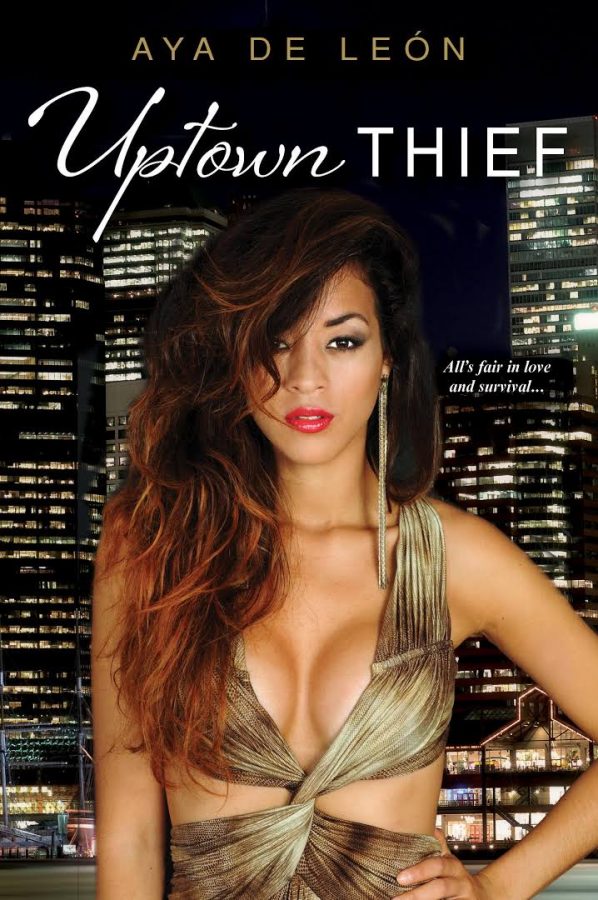 Slam poet and African American studies professor Aya de León’s new novel, Uptown Thief, is every activist sex worker’s fantasy: her protagonist Marisol Rivera is a women’s health clinic director by day and an escort agency manager and expert safe-cracker to fund that clinic for survival workers by night. True, any enterprising hooker who actually tried this would get her pet cause into very hot water. But reading about Marisol’s escapades teaming up with her escort employees to rob their rich clients’ friends, practicing some creative accounting to enter these “donations” on her books, is the next best thing to pulling it off yourself.
Slam poet and African American studies professor Aya de León’s new novel, Uptown Thief, is every activist sex worker’s fantasy: her protagonist Marisol Rivera is a women’s health clinic director by day and an escort agency manager and expert safe-cracker to fund that clinic for survival workers by night. True, any enterprising hooker who actually tried this would get her pet cause into very hot water. But reading about Marisol’s escapades teaming up with her escort employees to rob their rich clients’ friends, practicing some creative accounting to enter these “donations” on her books, is the next best thing to pulling it off yourself.
Though de León has never been a sex worker, she’s been open about her respect for her ex-stripper mother and her aunt’s sex work. Her book is stolidly pro-sex worker without being blandly sex positive, representing a spectrum of experiences in its characters’ diverse backgrounds of high end escorting, survival sex work, and trafficking and abuse survival. There’s even a Live Nude Girls Unite poster in the clinic’s office. There’s never any hint of judgement in the tone de León takes narrating these women’s lives, although occasionally a tinge of didactic respectability politics bleeds through in the novel’s focus on clinic entrepreneurship classes and grad student escorts. Still, a story in which every whore makes good is a refreshing change from our usual crime fiction fate of death or destitution.
De Leon does make some gaffes in describing the way the agency operates which demonstrate her lack of personal experience with the work. Marisol’s escorts dress up as delivery workers in order to get into fancy hotels (huh?). And the agency’s clients agree on every sexual act they’ll perform with her employees in advance with her over the phone—a good way to get arrested. But once I started reading the book as a wish-fulfillment vehicle instead of holding it up to an impossible standard of realism, I began to really enjoy it. Plus, de León doesn’t make as many bloopers writing about sex work practice as many other writers do, perhaps because she made a point of having sex worker consultants edit her early manuscript.
The author’s general pro-lumpenprole stance is very clear here. For example, Marisol’s ex-NYPD love interest, Raul, left the department after suing them for racial discrimination and confesses that his one major regret is becoming a cop. When he catches on to Marisol’s heists, he’s openly admiring, wishing he could be a barrio Robin Hood as well. de León depicts some of the dangers sex workers commonly face by making his white ex-partner a cop who extorted sex from workers with the threat of arrest. And, of course, one of the most reprehensible characters in the book besides the abusive pimp is a snooty billionaire financier client.
De León also exhibits her populism in the way she’s marketed the novel: she’s explained in interviews that she purposefully branded the book as a women’s urban crime novel, a la Zane and Sister Souljah, to make it accessible to as many kinds of readers as possible. Indeed, one activist I know told me that this genre represents the most requested (and sadly, least donated) books to the books for women prisoners program she works with.
The book scores high marks in terms of other issues of representation as well: A good percentage of the novel’s supporting characters are LGBT, and Marisol’s Puerto Rican culture is integrated into every part of her character and backstory rather than simply being a stat. Her escort thief crew is composed of a Korean/white lesbian couple and a Black public health student.
But the novel goes beyond being absorbing light reading for the politicized. Its portrayal of Marisol’s slow work through her PTSD after growing up protecting her little sister from their abusive uncle, then supporting her through escorting and sugar work, is both tender and true to life. Between scores, the reader traces her development through using workaholism and casual hookups to cope to finally burning out, taking a vacation, and trying to date again. Her internal monologue throughout is poignant, insightful, and relatable. I particularly felt for her when, after a romantic disappointment, she muses:
All that love he talked about? That wasn’t love…Love was putting on your dead mother’s dress and fucking a stranger to keep your little sister out of foster care.
In Marisol, the author has created a character at once astonishingly capable and understandably vulnerable, a nuanced and complicated Latina heroine anyone can identify with.
And even if de León sometimes falters when it comes to the details of escorting, she has a knack for getting the bottom line of sex work right. For instance, the rich celebrity client, who ended up drunkenly throwing up all night at the overnight session and then whining for sex in the morning? The one who seemed to do a turnaround, begging to actually date one of the escorts, bringing her to the Oscars with him? Just as he would be in real life, he’s, yup, still an asshole in the end.
De León has stated that Uptown Thief is itself a “cultural heist”: “I’m stealing an audience that has historically… read books that don’t necessarily have these political values,” she explained on KALW Public Radio, “and I’m sneaking these values in there.” But many leftist sex workers have already embraced these values of wealth redistribution and justice for marginalized people, leaving us able to thoroughly delight in a genre novel which is anything but a guilty pleasure.

An insight filled review that highlights the principal themes of the author for the less erudite among us. A deliteful service. Thank you for sharing your insights.